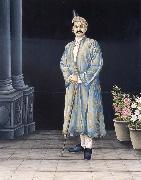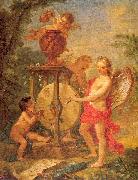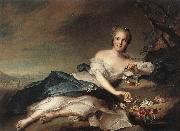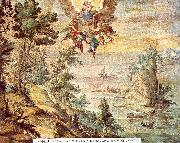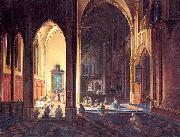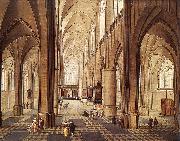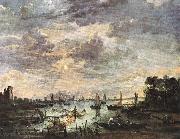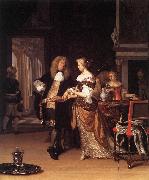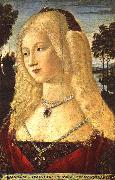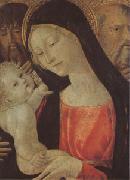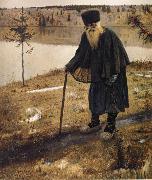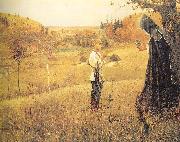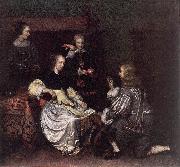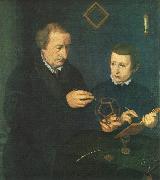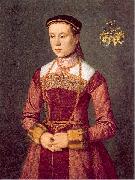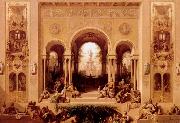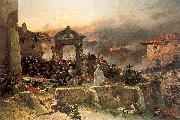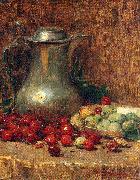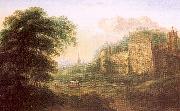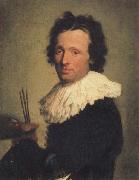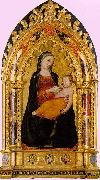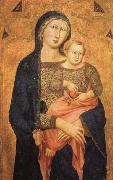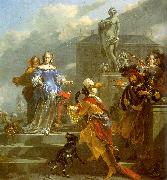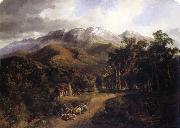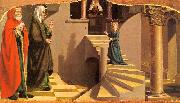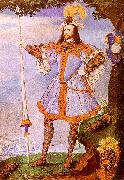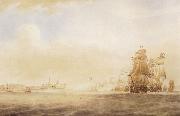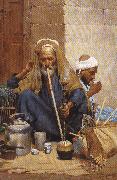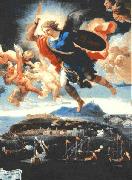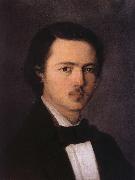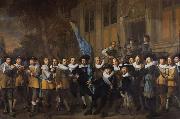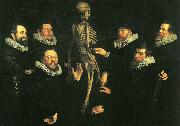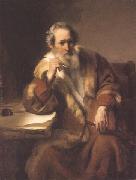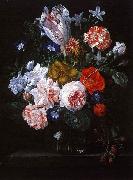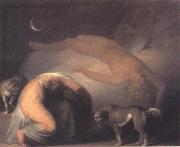|
|
|
|
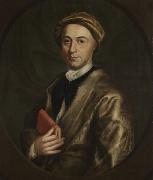 |
Nathaniel Smibert
|
|
(January 20, 1734 - November 8, 1756), was an artist in Boston, Massachusetts, in the mid-18th century. Born in Boston in 1734, he trained as a painter with his father, the artist John Smybert, and produced several portraits, notably of Ezra Stiles, architect Peter Harrison, and Dorothy Wendell (in the Collection of Dr John L Hale, Boston). |
|
|
|
|
|
|
|
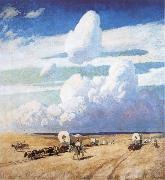 |
NC Wyeth
|
|
American Golden Age Illustrator, 1882-1945 |
|
|
|
|
|
|
|
|
|
|
|
|
|
|
|
|
|
|
|
|
|
|
|
|
|
|
|
|
|
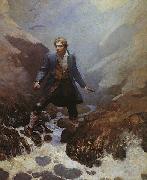 |
Newell Convers Wyeth
|
|
Newell Convers Wyeth (October 22, 1882 - October 19, 1945), known as N.C. Wyeth, was an American artist and illustrator. He was the pupil of artist Howard Pyle and became one of America's greatest illustrators. During his lifetime, Wyeth created over 3,000 paintings and illustrated 112 books, 25 of them for Scribner's, the Scribner Classics, which is the work for which he is best-known. The first of these, Treasure Island, was his masterpiece and the proceeds paid for his studio. Wyeth was a realist painter just as the camera and photography began to compete with his craft. Sometimes seen as melodramatic, his illustrations were designed to be understood quickly. Wyeth, who was both a painter and an illustrator, understood the difference, and said in 1908, "Painting and illustration cannot be mixedeone cannot merge from one into the other."
|
|
|
|
|
|
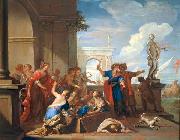 |
Niccolo Bambini
|
|
(1651-1736) was an Italian painter of the late-Renaissance and early-Baroque periods.
He was born in Venice, and first studied under Giulio Mazzoni at Venice; but afterwards went to Rome, where he became a pupil of Carlo Maratti. He painted for the church of San Stefano soon after his return from Rome. He died in Venice. He had two sons who were painters, Giovanni and Stefano. |
|
|
|
|
|
|
|
|
|
|
|
|
|
|
|
|
|
 |
Nicholas Roerich
|
|
(Russian: ,October 9, 1874 - December 13, 1947), was a Russian mystic, painter, philosopher, scientist, writer, traveler, and public figure. A prolific artist, he created thousands of paintings (many of them are exhibited in well-known museums of the world) and about 30 literary works. Roerich was an author and initiator of an international pact for the protection of artistic and academic institutions and historical sites (Roerich's Pact) and a founder of an international movement for the defence of culture. Roerich earned several nominations for the Nobel Prize. |
|
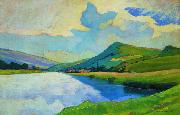 |
Nico Klopp
|
|
Den Nico Klopp war e letzebuergesche Moler. Hien ass den 18. September 1894 zu Bech-Maacher gebuer, an den 29. Dezember 1930 an der Stad Lëtzebuerg gestuerwen, wahrscheinlech un engem Gehirtumor, am Alter vun nëmme 36 Joer. Hie gëtt zu de postimpressionistesche Moler gerechent.
Säi LiewenDen Nico Klopp koum aus dem Wënzermilieu. Hien huet d'Handwierkerschoul an der Stad besicht. Seng Eltere si frei gestuerwen. No hirem Doud, huet hie sech fräi gefillt, fir vun 1915-1920 zu Dusseldorf a Weimar Konscht ze studeieren. Well hie vun der Konscht aleng net liewe konnt, war hien, vun 1923 un, Gemengereceveur zu Reimech.
Zäitweileg huet hien op Schoulen Zeechenunterrecht ginn, an huet nach en Täschegeld als Kannengerchersziichter verdengt. 1927 huet hie sech mat e puer anere Kënschtler, wei dem Joseph Kutter, dem Claus Cito, dem Auguste Tremont an anere vum Cercle Artistique getrennt, well him de Cercle ze reckstänneg war. Si goufe Sezessioniste genannt, well se 1927 e Salon de la Secession" organiseiert haten.
E puer vu senge Wierker sinn am Nationalmusee fir Geschicht a Konscht an der Stad ze gesinn.
Den Nico Klopp huet vill Biller vun der Musel gemoolt, bekannt si virun allem seng Biller vun der Muselbreck zu Reimech. Hien huet och Blummebiller gemoolt an dobäi hat hien eng Präferenz fir Tulpen. Ausserdeem war hien e Meeschter an Holz- a Linoschnëtter. |
|
|
|
|
|
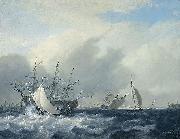 |
Nicolaas Baur
|
|
who was born at Harlingen in 1767, was the son of Hendricus Antonius Baur, a portrait painter (born 1736, died 1817). He painted landscapes and views of cities, and many houses in Holland are embellished by his works. He also painted moonlight and winter scenes; and was particularly successful in marine subjects. He is considered one of the best of the later Dutch marine painters. He died at Harlingen in 1820.
|
|
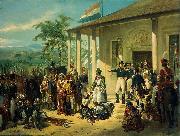 |
Nicolaas Pieneman
|
|
(1 January 1809, Amersfoort - 30 December 1860, Amsterdam) was a Dutch painter and lithographer. His father, Jan Willem Pieneman, was also a painter. Nicolaas Pieneman was a friend of William II of the Netherlands, whom he painted during his inauguration in 1840 |
|
|
|
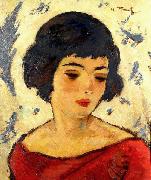 |
Nicolae Tonitza
|
|
(Romanian pronunciation: [nikoˈla.e toˈnit͡sa]; April 13, 1886 - February 27, 1940) was a Romanian painter, engraver, lithographer, journalist and art critic. Drawing inspiration from Post-impressionism and Expressionism, he had a major role in introducing modernist guidelines to local art.
Born in Bârlad, he left his home town in 1902 in order to attend the Iaşi National School of Fine Arts, where he had among his teachers Gheorghe Popovici and Emanoil Bardasare.The following year he visited Italy together with University of Bucharest students of archeology under the direction of Grigore Tocilescu.During that period, together with some of his fellow students, Tonitza painted the walls of Grozeşti church.
In 1908 he left for Munich, where he attended the Royal Academy of Fine Arts; he began publishing political cartoons in Furnica, and contributing art criticism articles to Arta Română. Tonitza spent the following three years in Paris, where he visited artists' studios, and studied famous paintings.Although the young artist's creation would initially conform to the prevalent style, his gift for colour and his personal touch would eventually lead him towards experiment.Throughout his life, he remained committed to the Munich School, hailing its innovative style over the supposedly "obscure imitators of Matisse".
|
|
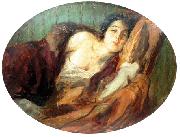 |
Nicolae Vermont
|
|
(October 10, 1866 - June 14, 1932) was a Romanian realist painter, graphic artist and muralist. He was noted for his wide range of subjects and his interest in social issues, and was an associate of the post-Impressionists Ştefan Luchian and Constantin Artachino, as well as a friend of the controversial art collector and political figure Alexandru Bogdan-Piteşti.
Born in Bacău, Vermont belonged to the Jewish community. Late in his life, Vermont abandoned Judaism and converted to the Romanian Orthodox Church.
He began his career in 1884, as a contributor to the journal Universul, while studying with Theodor Aman at the Academy of Fine Arts in Bucharest (graduated 1886). Vermont completed his training at the Munich Akademie der Bildenden Kenste (1893). He was able to attend the latter institution after being endorsed by the major Romanian artist Nicolae Grigorescu. |
|
|
|
|
|
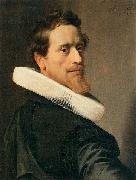 |
Nicolaes Eliaszoon Pickenoy
|
|
(10 January 1588 - 1653/1656) was a Dutch painter of Flemish origin. Pickenoy was possibly a pupil of Cornelis van der Voort and presumably Bartholomeus van der Helst was his own pupil.
He was the son of the Antwerp monumental mason Elias Claeszoon Pickenoy (1565-1640) and Heijltje Laurens s'Jonge (1562-1638), who emigrated to Amsterdam before Nicolaes Pickenoy was born. In 1621, living near the Oude Kerk, he married Levijntje Bouwens (1599-na 1656), an orphan of 21 years. They had ten children: Sara and Elias died young.
Pickenoy painted large Schuttersstukken, group portraits of the regents of the orphanage, and individual portraits of local or national celebrities like Nicolaes Tulp, Cornelis de Graeff, Maarten Harpertszoon Tromp and Jochem Hendrickszoon Swartenhont, Elisabeth Bas's husband. The earliest picture ascribed to the artist is "Dr. Sebastiaen Egbertz de Vrij's Osteological Presentation" of 1619, now in Amsterdam Historisch Museum. His heyday was ca. 1630-1637, a period marked by a high artistic level and numerous commissions from prominent patrons. After 1637 he painted little, save for a number of prestigiouseand lucrativeegroup portraits. Besides portraits, he also painted a small number of biblical subjects, one of which can be seen in the Museum Catharijneconvent. The Rijksmuseum Amsterdam and Amsterdams Historisch Museum holds many of his best works, not least the Schutterstukken or militia paintings.
In 1637 he bought from Adriaen Pauw the house on the corner of Sint Anthoniessluis and Jodenbreestraat, a fashionable area with many painters, art dealers, jewellers and so on. The house had previously been owned by his supposed master, Cornelis van der Voort, and later by Hendrick van Uylenburgh. During the years 1631-1634 the latter was collaborating with Rembrandt van Rijn, who painted numerous portraits for Van Uylenburgh's art business. Thus the house Pickenoy purchased had been a centre of Amsterdam portraiture for decades. In 1639 Rembrandt returned to the neighbourhood as he bought the house next to Pickenoys, the present day Rembrandthuis. Rembrandt could leave his house via an exit onto the Zwanenburgwal under the house of his neighbor Pickenoy. He brought out Night Watchepainted in his courtyarderolled up through the tunnel. Like Rembrandt, Pickenoy was not able to bring up the loan and so after eight years he sold the house.
The work of Pickenoy is difficult to distinguish from that of some of his contemporaries. Typical of Pickenoy are the fiercely invading light that makes the heads stand out sharply, the somewhat exaggerated gestures, the large greenish brown shadows and the odd-shaped eyes.
|
|
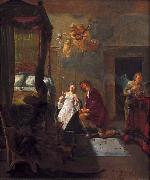 |
Nicolaes Knupfer
|
|
(1609 - 1655) was a Dutch Golden Age painter.
Knepfer was trained in Leipzig, where according to Houbraken he was apprenticed to Emanuel Nysen. He then moved to Magdeburg where he found work making brushes for artists. He stayed there until 1630, and then moved to Utrecht to work with Abraham Bloemaert. He lived with him for two years and then established his own studio in Utrecht, where in 1637 he became a visiting member of the Guild of St. Luke. He worked on the decorations of the castle Kronborg in Denemarken, and painted figures in the landscapes of Jan Both and Jan Baptist Weenix. Knepfer was a successful teacher, whose students were great painters after him, such as Jan Steen, Gabriel Metsu, Ary de Vois, and Pieter Crijnse Volmarijn.
|
|
|
|
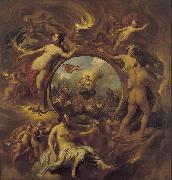 |
Nicolaes Pietersz. Berchem
|
|
(1 October 1620 - 18 February 1683) was a highly esteemed and prolific Dutch Golden Age painter of pastoral landscapes, populated with mythological or biblical figures, but also of a number of allegories and genre pieces.
Born in Haarlem, he received instruction from his father Pieter Claesz, and from the painters Jan van Goyen, Pieter de Grebber, Jan Baptist Weenix, Jan Wils and Claes Cornelisz. Moeyaert.According to Houbraken, Carel de Moor told him that Berchem got his name from two words "Berg hem" for "Save him!", an expression used by his fellows in Van Goyen's workshop whenever his father chased him there with the intent to beat him. No trip or Grand Tour by Berchem was documented by Houbraken though he mentioned another story about the "Berg hem!" nickname which came from Berchem's conscription as a sailor; the man in charge of impressment knew him and sent him ashore with the words "Save him!".Today his name is assumed to come from his father's hometown of Berchem, Antwerp. According to the RKD he traveled to Italy with Jan Baptist Weenix, whom he called his cousin, in 1642-5. Works by him are signed both as "CBerghem" and "Berchem". |
|
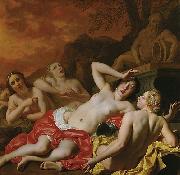 |
Nicolaes van Helt Stockade
|
|
(1614-1669), was a Dutch Golden Age painterAccording to Houbraken, Joost van den Vondel made a poem about him.
According to the RKD he became a master in the Antwerp Guild of Saint Luke in 1646 and worked on the city hall of Nijmegen and the Amsterdam City Hall.
|
|
|
|
|
|
|









